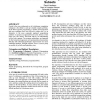151 search results - page 13 / 31 » Seeding Genetic Programming Populations |
GECCO
2007
Springer
14 years 1 months ago
2007
Springer
Crucial to the more widespread use of evolutionary computation techniques is the ability to scale up to handle complex problems. In the field of genetic programming, a number of d...
PPSN
2000
Springer
13 years 11 months ago
2000
Springer
To investigate the fundamental causes of bloat, six artificial random binary tree search spaces are presented. Fitness is given by program syntax (the genetic programming genotype)...
Publication
In this paper we address the problem of defining a measure of diversity for a population of individuals whose genome can be subjected to major reorganizations during the evolution...
EUROGP
2000
Springer
13 years 11 months ago
2000
Springer
The use of FPGA based custom computing platforms is proposed for implementing linearly structured Genetic Programs. Such a context enables consideration of micro architectural and ...
GECCO
2000
Springer
13 years 11 months ago
2000
Springer
In earlier work we predicted program size would grow in the limit at a quadratic rate and up to fty generations we measured bloat O(generations1:2;1:5). On two simple benchmarks w...

